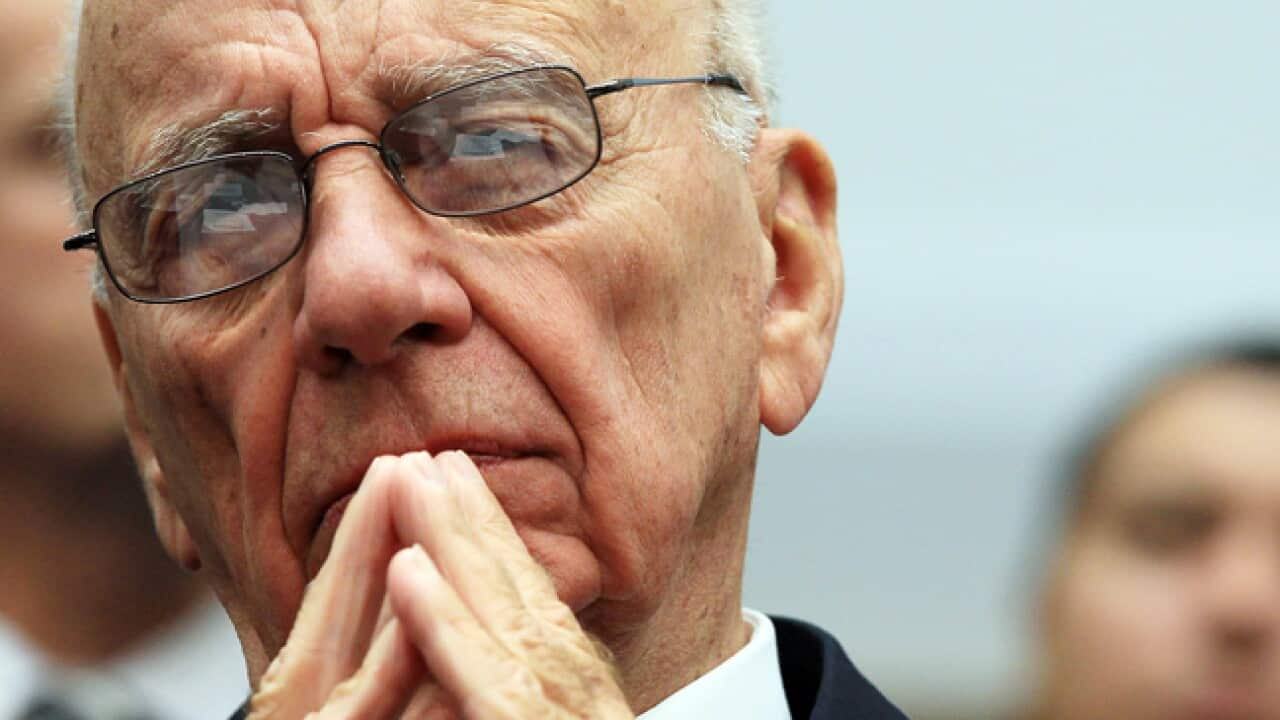Rupert Murdoch’s special to an exclusive meeting of the world’s most powerful finance ministers got a second airing this week.
In a breathless front-page “exclusive” in The Australian, Paul Kelly that his boss warned the world’s financial grandees their policies were serving to widen the gap between rich and poor, which was leading to social polarisation.
Kelly’s article was not an “exclusive” – others had the same speech on October 17 – and it was not “news” as the dinner had been held on October 9.
While the headline – Equality at risk in the West – suggested that “Citizen Murdoch” had astonishingly morphed into “Comrade Murdoch,” a careful reading of the article reveals his prescriptions for global prosperity were the standard Murdoch fare of deregulation and reducing corporate tax rates.
Presumably, the newly-formed wealth created by these policies will trickle down to the poor of the earth. This argument was refuted almost immediately by Alan Kohler in , who pointed out that:
“Rising inequality began in the 1980s and was the direct result of Reganomics” and his pursuit of tax breaks for the rich.
Murdoch also segued into the evils of tax avoidance, and particularly the unprincipled tactics used by Google. He went on to explain that Google paid hardly any tax in the countries where it made its profits, instead using complex corporate structures to transfer those profits to tax havens.
Certainly companies that sell over the internet have invented new ways of reducing their tax bill. In the case of Google, it books profits from sales made in Australia to overseas subsidiaries that are located in low-taxing countries. As a result, in 2011 Google paid US$74,000 tax, rising to US$7.1 million in 2013 from a revenue base of $1.8 billion.
Other tech companies, and Microsoft in particular, have used similar strategies to reduce the amount of tax they pay.
This was dangerous territory for Murdoch to step into as News Corporation (operating under the umbrella of 21st Century Fox) has engaged in some creative tax engineering of its own. According to a by the Tax Justice Network Australia, Murdoch’s companies paid the Australian Tax Office a miserly 1.1% on pre-tax profits of A$5.54 billion over the period 2004-2013, which was helped by complex financial transactions among its 146 subsidiaries, including 25 in the Virgin Islands and 19 in Mauritius.
Murdoch’s mauling of Google came as no surprise, as for years he had been feuding with the internet behemoth, a cause that has been predictably picked up by his newspapers, led by the
In his speech, Murdoch accused Google of “piracy". Behind his rhetoric, Murdoch fears Google is eroding his profits by aggregating free news sources and supporting his competitors, and is limiting the visibility of his company’s news sites because their content is hidden behind paywalls.
Google has not taken these attacks lying down and has created a blog, cheekily titled , refuting his allegations of piracy.
Vested interests
What the world economic policy elite made of Murdoch’s use of their forum to pursue a commercial feud was not reported, although they must have been scratching their heads on how this was relevant to returning the world to prosperity.
Murdoch’s entry on the international stage is a timely reminder some in the business community will use every opportunity to pursue their own vested interests. In most cases they will cleverly dress them up as sound policy, but in this instance Murdoch carelessly let the veil fall as he used the occasion to savage a commercial competitor.
The question left hanging is whether Hockey supports Murdoch’s narrow view on tax avoidance and whether he is promoting it among his G20 colleagues. Does this signal that he is unlikely to support aggressive policies by the G20 to end old-fashioned tax avoidance by multinational firms, as expertly executed by transnational firms like News Corporation, and only focus on the new kids on the block, who have found new ways to game the system?
Up to now, the G20 has only to automatic exchange of tax information, but has not yet shown it has the stomach to seriously tackle the widespread use of tax havens and transfer pricing, and ensuring profits are taxed in the location where the economic activity takes place.
As the host of the G20, Australia is in a position to lead the way. However, it sent out all the wrong signals by allowing Murdoch to lecture the world’s leading finance ministers on tax. Harry Blutstein does not work for, consult to, own shares in or receive funding from any company or organisation that would benefit from this article, and has no relevant affiliations.
Harry Blutstein does not work for, consult to, own shares in or receive funding from any company or organisation that would benefit from this article, and has no relevant affiliations.









